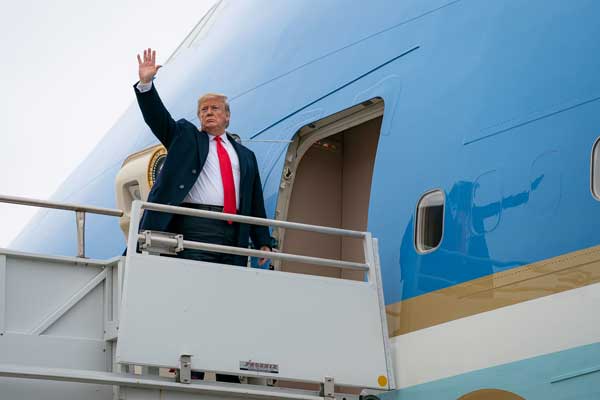Trump says U.S. relations with North Korea: “very big asset for everybody”

[A photo of President Trump boarding Air Force One, Photo Credit to Flickr]
President Trump on February 8th said the U.S. will have relations with North Korea, emphasizing his personal relationship with Kim Jung Un, saying ‘I get along with him, he gets along with me and that‘s a good thing, not a bad thing’, in a joint press conference.
In his strongest statement of the day, Trump reaffirmed America’s alliance with Japan, declaring, “The United States is totally committed to the security of Japan. We will extend the full strength of American deterrence capabilities and defense of our friend and ally, 100 percent.”
The summit, which was the first proper correspondence between the 2025 Trump administration and Japan’s government, covered several key areas of cooperation between the two nations.
Japanese Prime Minister Shigeru Ishiba expressed support for U.S. engagement with Japan and North Korea, emphasizing the need to address North Korea’s nuclear missile program and achieve complete denuclearization.
Trump’s history with North Korea has been newsworthy, as he became the first U.S. President to cross the border between the two Koreas during his first term.
While two summits in Vietnam and Singapore did not achieve North Korea’s denuclearization, Trump maintained that his relationship with Kim Jong Un remains strong, referencing Kim sent him “love letters.”
A major focus of the face-to-face meeting centered on China’s growing military and economic presence in the region.
The two leaders pledged to advance coordinated cooperation with aligned nations including potential partnerships with South Korea, the Philippines, Australia, and India.
The two leaders pledged to advance a coordinated cooperation with aligned nations includingSouth Korea, the Philippines, Australia, and India.
Both leaders stressed the importance of maintaining “peace and stability in the Taiwan Strait,” reinforcing existing security treaties between Japan and the U.S.
On domestic matters, Trump encouraged Japan to increase its defense budget.
Ishiba responded by stating that Japan would raise defense spending “on its own initiative” rather than through U.S. direction.
The economic discussion revealed Trump’s intention to reduce the trade deficit with Japan with plans for upcoming trade talks in the following weeks.
He also announced that Japan would begin receiving new shipments of liquefied natural gas, aligning with his administration’s focus on fossil fuel production.
The meeting takes on added importance as Trump’s foreign policy continues to evolve, featuring new tariffs, calls for increased defense funding globally, and potential trade negotiations.
These developments suggest a continuation of his previous approach to East Asian relations, particularly regarding North Korea and China.
As relations unfold, Trump’s stance on East Asian countries appears to mirror his 2016 positions, especially concerning North Korea and China.
This alignment indicates potential continuity in U.S. foreign policy in the region under his administration.

- Joonpyo Kim / Grade 11
- Haven Christian School

![THE HERALD STUDENT REPORTERS [US]](/assets/images/logo_student_us.png)
![THE HERALD STUDENT REPORTERS [Canada]](/assets/images/logo_student_ca.png)
